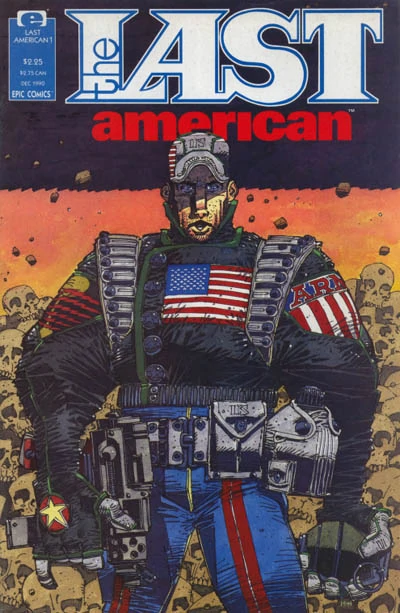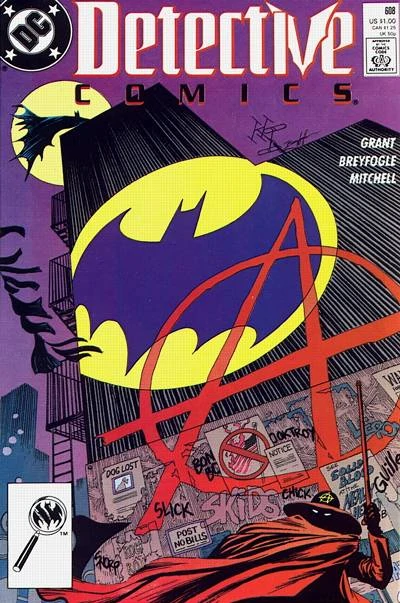Remembering Alan Grant
The idiosyncratic politics of the late comic writer

2022 has been a bad year for creators involved in the Batman comic books. First, Neal Adams passed away on April 28, then George Pérez (who co-created the third Robin) on May 6, then Tim Sale on June 16, and now Alan Grant on July 20. All of these men had a profound influence on one of the most preeminent figures in U.S. pop culture, but Alan Grant’s run writing Detective Comics, Batman, and Shadow of the Bat from the late 1980s into the early 1990s may be the platonic ideal of what Batman stories should look and read like.
Alan Grant was born in Bristol, England in 1943 but his family moved to Scotland before he turned one. Grant came from a working-class background as his father and grandfather were both coal miners. As a child, he was regularly beaten at school to correct his left-handedness and repeatedly kicked out of school for alleged discipline problems. This upbringing, along with a 1969 arrest for possession of LSD, led to a lifelong skepticism towards authority that would be a running theme throughout his writing career. After a brief time working at a bank, he started his career in comics as an editor for publisher D.C. Thompson who paid so little that Grant had to work as a waiter part-time. When his boss saw him at this job he was told to quit because the boss didn’t want to give the impression that D.C. Thompson paid its employees poorly. After working for D.C. Thompson, he left for IPC where he worked on the title Starlord before that title became folded into the popular science fiction anthology 2000 AD. After the termination of Starlord, he continued writing for 2000 AD with his first work seeing print in 1979.
Grant formed a partnership with fellow comic writer John Wagner for around a ten-year period starting in 1979. Together the two worked on the popular Judge Dredd feature, about a fascist lawman in a dystopian future United States, in 2000 AD. On the title, the two collaborated with a host of talented artists including Brian Bolland, Carlos Ezquerra, Steve Dillon, Mick McMahon, and more to tell epic stories like “Block Mania” and “The Apocalypse War”. The series also contained elements of comedy and political satire. The story “Letter From a Democrat” features Dredd killing a group of Democratic Tendency terrorists (the name taken from the Marxist Militant Tendency) and giving a chilling warning: “Democracy’s not for the people, citizen”. A follow-up story “Revolution” tells of Dredd and his compatriots in the Justice Department sabotaging a pro-democracy march to undermine opposition to the Judge’s totalitarian rule. Wagner and Grant’s writing partnership ended because of a difference of opinion on where to take the character of Judge Dredd. Wagner wanted to humanize the character while Grant wanted to push him further into the realm of villainy. The differences came to a head during the “Oz” storyline in which Dredd lets a young lawbreaker go instead of shooting him in the back, as Grant wanted.

Also in the pages of 2000 AD Grant and Wagner wrote Strontium Dog, a series about a mutant bounty hunter, Johnny Alpha, who deals with prejudice because of his mutant heritage. In the same way as Marvel’s X-Men, the series uses mutants as an allegory for the oppression of minority groups. In the documentary Future Shock! The Story of 2000 AD, South African author Lauren Beukes recalls that the use of allegory allowed Strontium Dog to slip past the Apartheid-era censors and reach the hands of impressionable young readers. One of Grant and Wagner’s best collaborations was the four-issue miniseries the Last American (December 1990 – March 1991) illustrated by Mike McMahon. The story contains obvious anti-war, anti-militarist themes as protagonist Ulysses S. Pilgrim awakes from suspended animation after a nuclear war and has to travel across the irradiated wastelands of America to see if he is truly the last American. The big blocky style of McMahon’s cartooning is equally suited for the devastated American landscape and Pilgrim’s nightmarish delusions as he loses his grip on sanity. The story is draped in dread, very similar to the BBC drama Threads, with some bleak humor and political satire to lighten the mood. It’s also notable as the last story of the classic Wagner-Grant partnership.
As part of the comic book “British Invasion,” Wagner and Grant were brought over to work on Detective Comics, starring Batman. While Wagner left early on, due to the dissolution of their writing partnership, Alan Grant stayed to write Batman across three titles for an impressive 9 years. Grant spent the most fruitful part of this period working with Norm Breyfogle, an artist who excelled at expressionistic character work and fluid, dynamic action sequences. Grant’s Batman stories are laced with the dark humor and political satire he had previously developed in 2000 AD. Detective Comics 590 (September 1988) contains sympathetic Middle Eastern terrorists who draw out the hypocrisy of the U.S. government’s condemnation of terrorism while supporting tyrants and state terror around the globe. This message is even more impressive given the spate of stock Middle Eastern terrorist villains in 1980s popular fiction. The following issue, Detective Comics 591 (October 1988) contains an anti-racist message relating to the treatment of Aboriginal Australians.

Grant co-created several enduring Batman characters including the Corrosive Man, the Ratcatcher, serial killer Victor Zsasz, Scarface and the Ventriloquist (a gangster puppet who serves as the dual personality of the mild-mannered ventriloquist), and the left-wing vigilante Anarky. He debuted in Detective Comics 608 (November 1989) and was a perfect foil to Batman, young, cocky, and totally anti-establishment. In his first story arc, Anarky attacked corporate polluters and developers who wanted to expel a homeless camp to use the site for a bank. This puts Batman in much the same position as Judge Dredd, enforcing an unjust social system against a rebellious youngster. In the follow-up storyline from Detective Comics 618 – 621 (July – September 1990) Anarky robs multinational corporations via computer hacking and redistributes the money to the global poor before being foiled by Batman’s partner Robin. After a few more stories in this vein, Anarky fell victim to a philosophical change brought about by Grant’s conversion to the Ayn Rand-influenced “Neo-Tech” philosophy. Anarky went from declaring “I’m against anything that’s against people! Cruelty– Brutality– Exploitation… These are the enemies of the people” in Shadow of the Bat 17 (September 1993) to proclaiming the necessity of free-market capitalism in his own miniseries.
After quitting Shadow of the Bat in 1997, Alan Grant continued to work in comics. In 2012 he wrote the historical fiction the Loxleys and the War of 1812, which details U.S. imperialist expansion into Canada during the titular war and its effects on a Canadian family. In 2020 he helped put together the comic book Manieve Fights Back, which documented the Scottish village of Manieve’s struggles during COVID-19 lockdowns and included work from 60 villagers as well as various comic professionals, all to benefit local businesses that had been impacted. All the while he continued to do one-offs for 2000 AD or various Batman titles.
Grant’s politics were idiosyncratic and fluctuated throughout his life. In a 1988 Comics Journal interview, John Wagner described the duo as “right-wing with left-wing tendencies”. In the late 80s, he described himself as an anarchist and, as already mentioned, sometime in the 1990s he became a follower of Neo-Tech. In 2021 he said he was someone “who was thrown out of the Young Conservatives for being too Labour-minded and was thrown out of the Socialist Party for being too Conservative-minded.” Regardless of politics, his work continued to be impressive. However, obviously, those of us on the Left will look most fondly on his stories that espoused anti-racist, anti-corporate, anti-war politics. Alan Grant, rest in peace.
Featured Image Credit: Photos courtesy of wikimedia, Library of Congress, and wikimedia; modified by Tempest.
Categories
We want to hear what you think. Contact us at editors@tempestmag.org. And if you've enjoyed what you've read, please consider donating to support our work:
DonateHank Kennedy View All
Hank Kennedy is a Detroit area socialist, educator, and longtime comic book fan.
